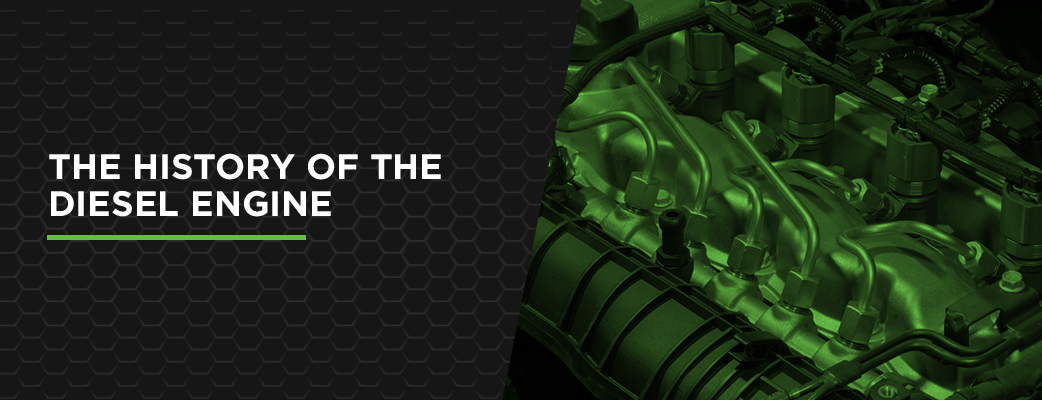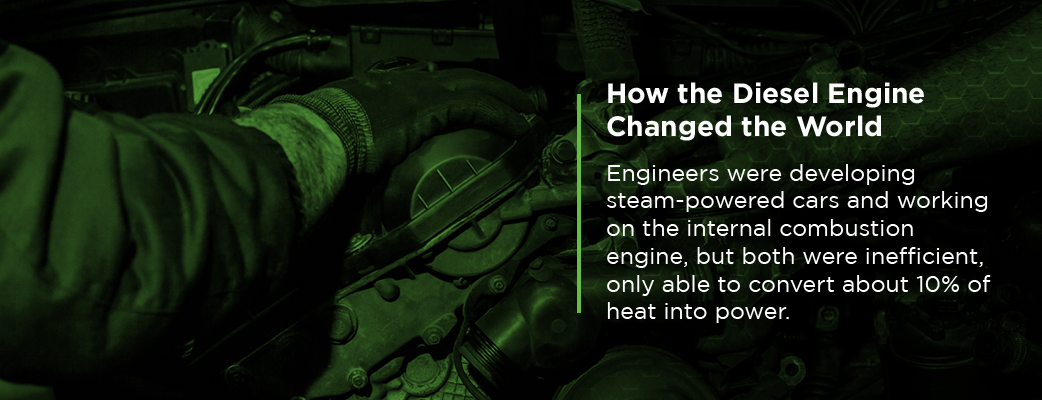
The diesel engine has a rich and storied history. While you may or may not know the name Rudolf Diesel, you’re likely familiar with his namesake invention. From the 1900s to the current day, diesel engines have been essential in many industries and have provided increased fuel efficiency in various applications. What began as a passion turned into one of the most important engineering developments of the Industrial Revolution.
Rudolf Diesel and the Invention of the Diesel Engine
Rudolph Diesel is the German engineer best known for being the inventor of the diesel engine. He was born in Paris, France in 1858, relocated to London, England in 1870 and would later move to Germany for his education and later works. Diesel attended Munich Polytechnic, and upon graduating, began his career as a thermal engineer.
Before Rudolph Diesel became the father of the diesel engine, he worked for the Linde Ice Machine Company as a refrigerator engineer. His impressive record as a student made him stand out to Carl von Linde, who hired diesel at his Paris office in 1880. With a stable job and a passion for invention, Diesel spent his free time designing an engine that would be more efficient than the steam-powered models, the most popular industrial power source at the time.
In 1892, now working at Linde’s firm in Berlin, Diesel finished his design and sought out a German development patent, which he would receive a year later. After the patent was approved, he published his written work titled “Theory and Construction of a Rational Heat Motor,” an essay that describes his engine. For the next few years, with the help of major German manufacturers, he created a series of engine models. In 1897, Diesel ran his first successful test, which began his rise to fame in the engine industry.
The Diesel Engine’s Tumultuous Road to Success
While the diesel engine was an incredible invention, its history involves a lot of turmoil, mainly centering around Diesel himself. From the time of the engine’s inception to when it became a major success, many events impacted its creation and development.
In the years after Diesel received the patent for his invention, he began to build models and run tests on them. Like most experimental runs, it took Diesel several tests to finally come up with the one that would become the new industry standard. He also had to try different types of fuel.
When ignition trials began, Diesel was using petrol. At one point, he was experimenting with the idea of an ammonia-fueled combustion engine, using the vapors and steam. Upon testing an ammonia model, it exploded, nearly killing Diesel. It took him many months to recover, but he came back with the same passion for finding a working configuration. The first diesel engine ran on peanut oil, demonstrating the valuable concept of biofuel.
Additionally, Diesel wasn’t the only inventor working on improving upon the engine. Before his model, there was an early rendition called the hot bulb engine. In 1890, Herbert Akroyd Stuart and Richard Hornsby patented their heavy-oil engine, with paraffin oil as the fuel. While Diesel’s engine testing focused on using compression as an ignition source, Stuart and Hornsby has already developed a prototype of a high-compression engine. However, Diesel’s version was highly adaptable and had several advantages that made it more popular.
One of the most controversial events related to Diesel was his mysterious and untimely death. On September 29, 1913, he was on his way to London onboard the SS Dresden. At some point during the voyage, he disappeared. Ten days later, his body was found floating in the water. Some sources claim it may have been suicide, while others speculate that there could have been several industries with a motive to do away with Diesel.
For one, Diesel was in debt by 1913, not yet able to profit from his invention. War had been looming over Europe, and as it drew nearer, the diesel engine was used for powering some of France’s submarines. In need of money, it was thought that Diesel may have been on his way to sell the engine patents to the British and that he was thrown overboard for it. Another theory is that crude oil companies were after him, as he had demonstrated the possibility of engines running on peanut oil, which would severely affect sales.
Diesel’s death remains a mystery, and there are plenty who believe foul play was at hand. Regardless of his death, Diesel’s engine lived on and continued to change the industry to what we know today.
How the Diesel Engine Changed the World
When Diesel was still a student, society needed a compact and efficient engine. Horses were still the main mode of transportation in the streets, while steam engines powered trains. People were actively looking for a way to replace the horse, as they were relatively unreliable and unclean. Engineers were developing steam-powered cars and working on the internal combustion engine, but both were inefficient, only able to convert about 10% of heat into power.

Diesel was intrigued by the theory that engines could potentially convert 75% to 100% of the internal combustion. So, when he began creating the diesel engine, he set out with a purpose to provide a much higher level of efficiency. His first working model was about 25% efficient, which was far lower than his aim but more than twice the amount of the alternatives. The diesel engine was revolutionary to efficiency, even though the early models needed work on reliability.
As Diesel continued to develop his engine, more advantages began to arise. For one, the engines were able to run on heavier fuel than petrol, which is both cheaper and easier to refine. Explosions were a concern with petrol, which gives off fumes, but diesel produces less, lowering the chance of an explosion.
With the Industrial Revolution and the onset of war in the early 1900s, diesel engines became an integral part of transportation. Not only were they much more viable options for cars, but they were also essential to submarine warfare. Engineers began to further develop his ideas to improve upon them and manufacture them for commercial use. After the patent expired, diesel engines became a mainstream part of many industries, from trains and transport to marine vessels.
The Diesel Engine As We Know It Today
Modern diesel engines have improved upon Rudolf Diesel’s original design, but they’re still based on the same concept. With the advancements throughout the years, today’s compression-ignition diesel engines are essential to a multitude of industries, and many of them have efficiencies of up to 43% to 44% conversion.
Along with higher efficiency rates and an increase in manufacturing efforts, engineers have been focusing on diesel engine emissions. Some of the latest developments are working towards reducing the amount of greenhouse gas they produce. Clean diesel engines help improve air quality, can keep emissions close to zero and even provide an efficiency boost.
Even though Rudolf Diesel was a German inventor and began developing the engine in Europe, diesel engineering is a huge source of American jobs. There are big-name manufacturers located around the world, but the U.S. supports about 1.25 million jobs related to diesel manufacturing, development, maintenance and fuel. In 2017 alone, U.S. manufacturers produced about 900,000 diesel engines for various purposes.
For Reliable Diesel Engine Parts, Trust Diesel Pro Power
With proper maintenance and a trustworthy parts dealer, you can keep your diesel engines running for years to come. Diesel Pro Power is your one-stop-shop for top-quality equipment at affordable prices. You’ll have access to Detroit Diesel and Cummins engine parts, Twin Disc and Allison marine transmission parts and more, all located on our easy-to-use site. We’ll help keep your marine vessels and industrial equipment running smooth, efficient and reliable.
To learn more about our services and products, contact us, browse our lists of diesel parts or check out our helpful resources.
Parts Catalog for Detroit Diesel Marine Engine
Parts Catalog for Cummins Marine Engine



 Free US Calls: 1-888-433-4735
Free US Calls: 1-888-433-4735 International: 305-545-5588
International: 305-545-5588

It may be worth noting that so called Diesel engine are not in fact Diesels. Most Diesels worked on the early Diesel cycle, where as the modern engine operates on the dual cycle. Doxford produced the so called oil engine working on the dual,cycle in 1910.
dieselpro.com
dieselpro.com